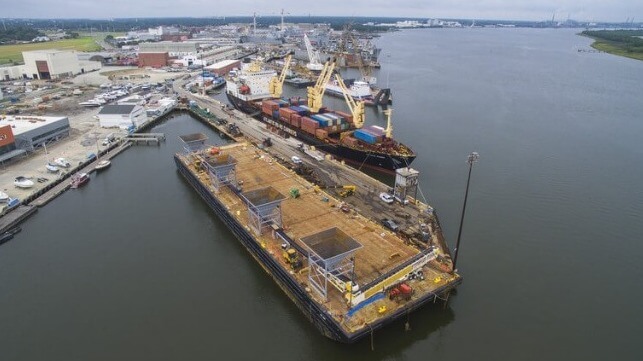MSC Containership Arrested for Damages from “Runaway Exit” from Charleston

The U.S. District Court in Charleston, South Carolina issued an order on Monday to arrest the MSC Michigan VII and placed it under the control of a court-appointed custodian. The move came after a North Charleston company, Carver Maritime, filed suit alleging the negligence of the ship caused significant damage to the company’s facility on the Cooper River.
The U.S. Coast Guard told The Post and Courier newspaper that it is now classifying the incident as “a major marine casualty,” due to an estimate of more than $500,000 in damages. This also means that the National Transportation Safety Board will become involved and is likely to jointly investigate the ship’s high-speed departure from Charleston on June 5.
Carver Maritime specializes in bulk and breakbulk cargoes with a terminal along the river. According to the court filing on June 9, they are citing the uncontrolled departure of the MSC vessel as causing significant damage to the pier and property. The suit names MSC Shipmanagement headquartered in Cyprus as well as the registered owner of the vessel, Kyveli Oceanway also of Cyprus.
The 80,000 dwt containership, with a capacity of 6,700 TEU, was built in 2000. It was departing Charleston at midday on June 5 when according to the pilot the vessel experienced a failure of her propulsion control systems and accelerated to a very fast speed well above the limits for the channel. The police temporarily closed a major roadway bridge crossing above the channel while the pilot expertly navigated the ship safely out to the ocean despite the excessive speed.
Multiple videos appeared online showing the impact of the wash of the speeding containership. The newspaper is reporting two recreational boaters suffered non-life-threatening injuries.
Carver told the court that the MSC Michigan VII was traveling over 15 knots, far in excess of the safe speed for that section of the Cooper River, when it passed its facility. At the time, the Norway Pearl, a 45,400 dwt bulker registered in the Bahamas, was “properly moored at Pier J” undergoing cargo operations.
The speeding MSC boxship “displaced a tremendous amount of water and generated a very large wake.” They report the water level at Pier J “dropped considerably” and sucked the Norway Pearl away from the pier and causing its mooring lines to become extremely taut. It then forced the Norway Pearl “violently” into Pier J causing the substantial damage.
Carver reports it is in the process of conducting damage inspections and surveys to the pier. The Norway Pearl departed Charleston on June 9. However, the company was hearing reports that the MSC Michigan VII was scheduled to depart Charleston on June 10 and moved with the court to have the vessel arrested. They are seeking to have the court order it sold at auction to cover the significant expenses Carver will incur in repairing the pier as well as dredging and other costs associated with the repairs. They did not provide an estimated cost for the repairs.
The court agreed and issued the warrant for the arrest on June 10. The MSC Michigan VII can not leave Charleston, where it is now docked and under the control of the court-appointed custodian.

